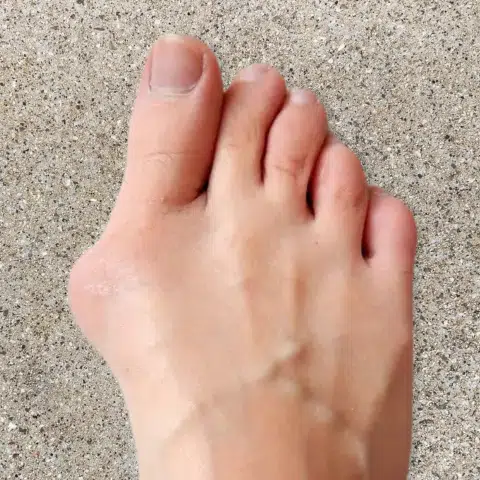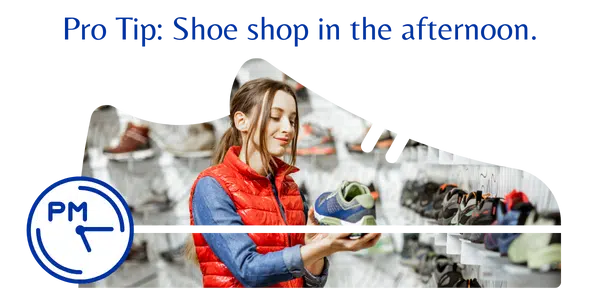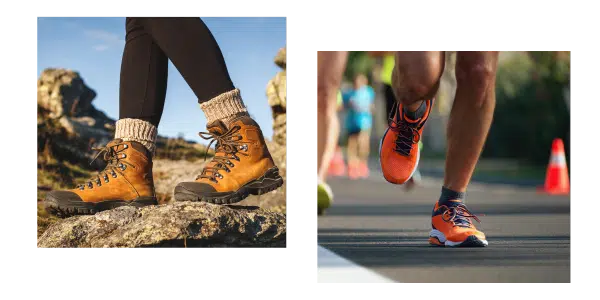We all know that a comfortable pair of shoes can make a day on your feet much more enjoyable. But what is a “comfortable shoe?” In today’s market there are countless options for shoe types, styles, support levels, etc. Here are a few basic guidelines to help you pick a shoe that will allow you to go the extra mile.
Bend and Twist
The first thing you should do when shoe shopping is pick up the shoe and start bending and twisting it. If you are looking for more support, the shoe should only bend in the toes, not in the arch. A stiffer shoe can help with heel pain, arch pain, and pain in the ball of the foot.
Toe Box – Upper Material
A “natural toe box” can allow more room for your toes to move freely. A natural toe box will be wider and deeper than a traditional shoe. These are usually best for people with toe deformities like bunions and hammertoes as they provide more room for the toes to move.

If you do have toe deformities, then an upper material that is soft and pliable will decrease pressure, prevent calluses, and reduce pain. Stay away from shoes with stiffer leather or those that have stitching/designs over the toes.
Length & Width
Shoes should be one thumb-width longer than your longest toe when you are standing. Remember, if you wear a size 8 in one shoe brand, that doesn’t mean you will wear a size 8 in all shoe brands.

If shoes feel too tight or constricting while trying them on, do not think “they will stretch.” Get a larger size. Your feet swell as the day goes on, so it is best to go shoe shopping in the afternoon. If you wear orthotics be sure to bring those with when you are shopping for shoes.
Cushioning
While a thicker sole can feel better on arthritic feet, it is more important that the sole does not bend in the arch. Find a stiff shoe first and then find one with your ideal amount of cushion.
Beware of shoes with too much cushion because they can make you feel unstable, and you could twist your ankle.
Rocker Bottom Sole
Athletic shoes offer a rocker bottom which can be helpful for people with pain in the ball of their feet or in their Achilles tendon. However, they can also cause overloading of the knee joint and knee pain. If you do buy these shoes because you have forefoot pain, be sure to wear them only occasionally.
Zero Drop Shoes
In most shoes, even those without a noticeable “heel,” the heel sits higher than the toe of the shoe. Zero drop shoes have no difference between the heel and the toe. This mimics a “barefoot” style of walking which can lead to increased stretching of the Achilles tendon and strengthening of the calf muscles. It can also relieve pressure on the ball of your foot. But these shoes can also lead to overuse injuries of the Achilles tendon so you should gradually transition to wearing them and avoid frequent use.
Tread

Tread helps your shoes grip different surfaces, so it is important to choose the right shoe for certain activities. You should not wear gym shoes when hiking and you should not wear trail shoes for playing basketball. Just because a shoe is comfortable playing pickleball doesn’t mean it will be comfortable hiking the Grand Canyon.
Quality Over Style
It is more important to choose a shoe that is better quality than the style or color that you want. This is especially true if it is a shoe that you will be doing a lot of activity in. One theory is “the more you behave, the more you can cheat.” In other words, if you want to wear stylish shoes to dinner on Saturday night, you better wear good supportive shoes during the day.
It can be easy to get overwhelmed when you are trying to pick out the perfect pair of shoes. Remember that these are all guidelines and not hard rules. If the shoe feels comfortable to you and doesn’t cause any pain, go ahead and wear it. If no shoes seem to help with your foot issues, it may be time for a visit with a podiatrist.

Dr. David Arens, DPM FACFAS
Podiatrist, Dr. David Arens, sees patients at Lakeview Clinic in Waconia and Chaska, MN. His practice involves all aspects of podiatric medicine and surgery. He performs surgery of all foot and ankle conditions ranging from bunions and hammertoes to fractures and chronic ankle pain. He believes in the importance of listening to the patient to develop the best specific treatment plan for each individual.
